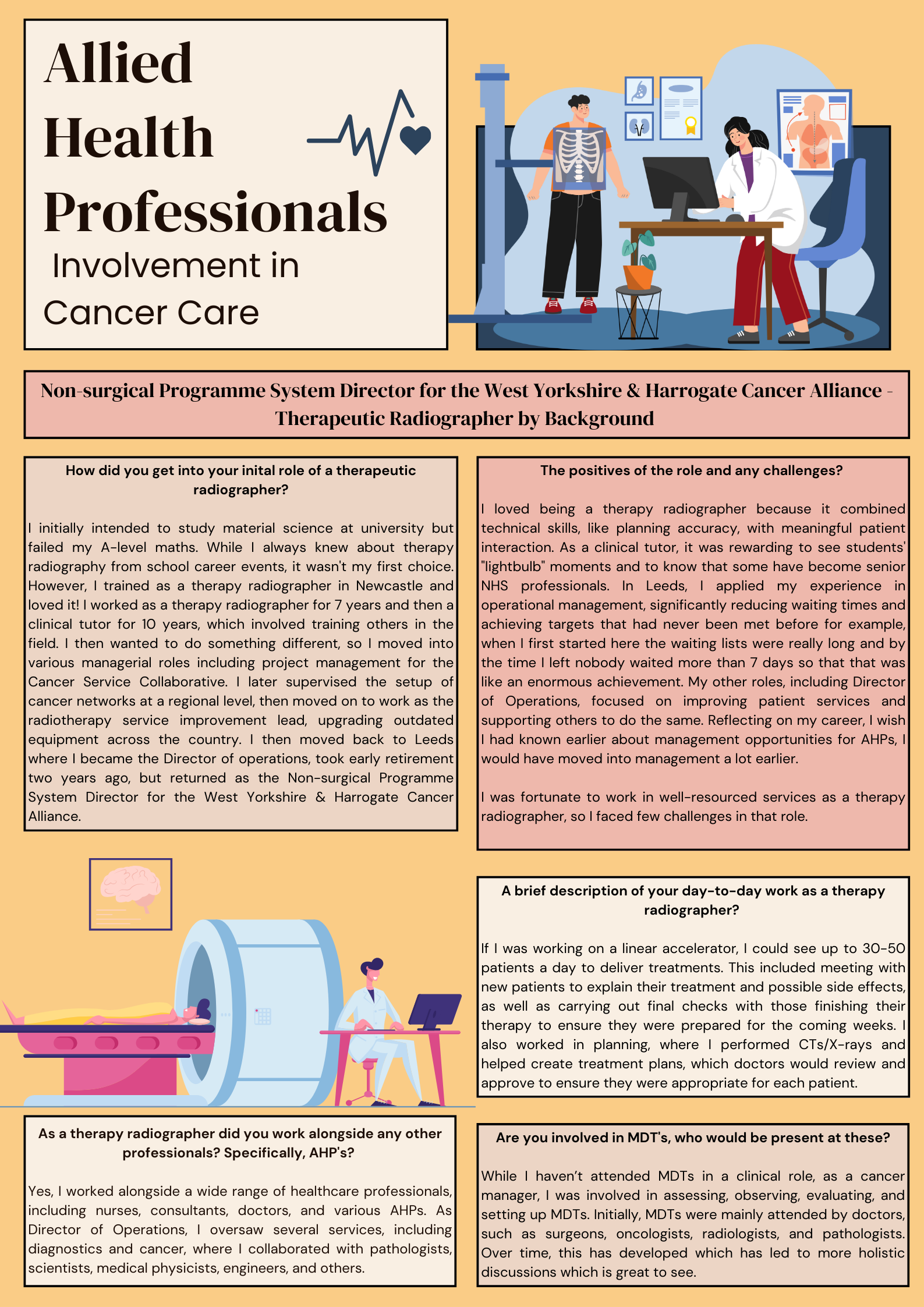Alex Kralevich
Oncology Dietitian

Allied health professionals’ involvement with cancer care

Cancer is a condition that is currently the leading cause of death worldwide however many can be cured if treated at an early stage of detection (1).
The condition is described as abnormal growth and reproduction of cells in a certain part of the body that becomes uncontrollable. These cells can damage nearby healthy tissue and organs which causes the cancer to spread around the body.
There are more common types which include breast, lung, prostate and bowel cancers and in a lifetime 1 in 2 people will be affected by some form of cancer with over 200 types (2). There are 5 main categories of cancer types which are carcinoma (skin or tissues surrounding internal organs), sarcoma (connective and supportive tissues), leukaemia (white blood cells in bone marrow), lymphoma and myeloma (immune system), brain and spinal cord cancers (central nervous system) (3).
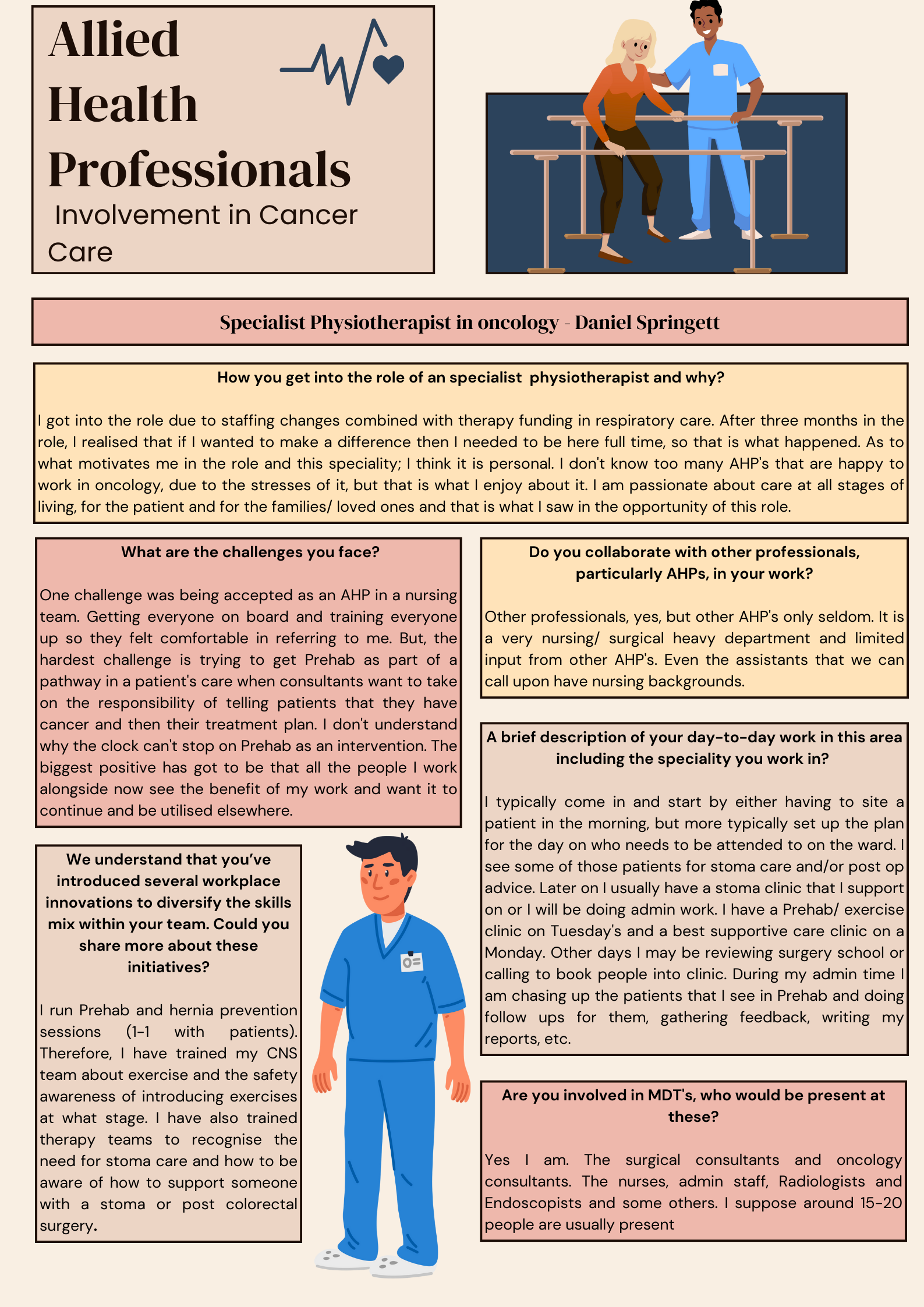
Treatments vary depending on an individual, cancer type and cancer stage but there are 3 main treatments available however many more options less commonly used.
Chemotherapy which is a drug that kills cancer cells and this drug travels in the blood therefore it can destroy cancer cells around the body. Due to the drug moving in the blood it can affect healthy cells which cause side effects such as increased risk of infection, sickly feeling, hair loss, anaemia, tiredness, appetite loss and taste changes.
Radiotherapy is another treatment which consists of radiation use at the affected area to destroy the cells including some healthy cells nearby. This treatment can work alongside chemotherapy for more effective outcomes. The side effects are similar to chemotherapy and include tiredness, appetite loss, sickness, skin reactions and hair loss in the area been treated.
Surgery is an alternative method to treating cancer when a surgeon will remove all or some of the cancer. It is often used alongside another treatment for example the cancer will be shrunk before surgically removing the rest and after surgery having further treatment to remove any cancer cells that might have been missed. Cancer surgery types are similar to other surgeries and will be based on the cancer type, size and individual. Side effects of this treatment is the recovery from surgery when pain and sickness might occur (4).
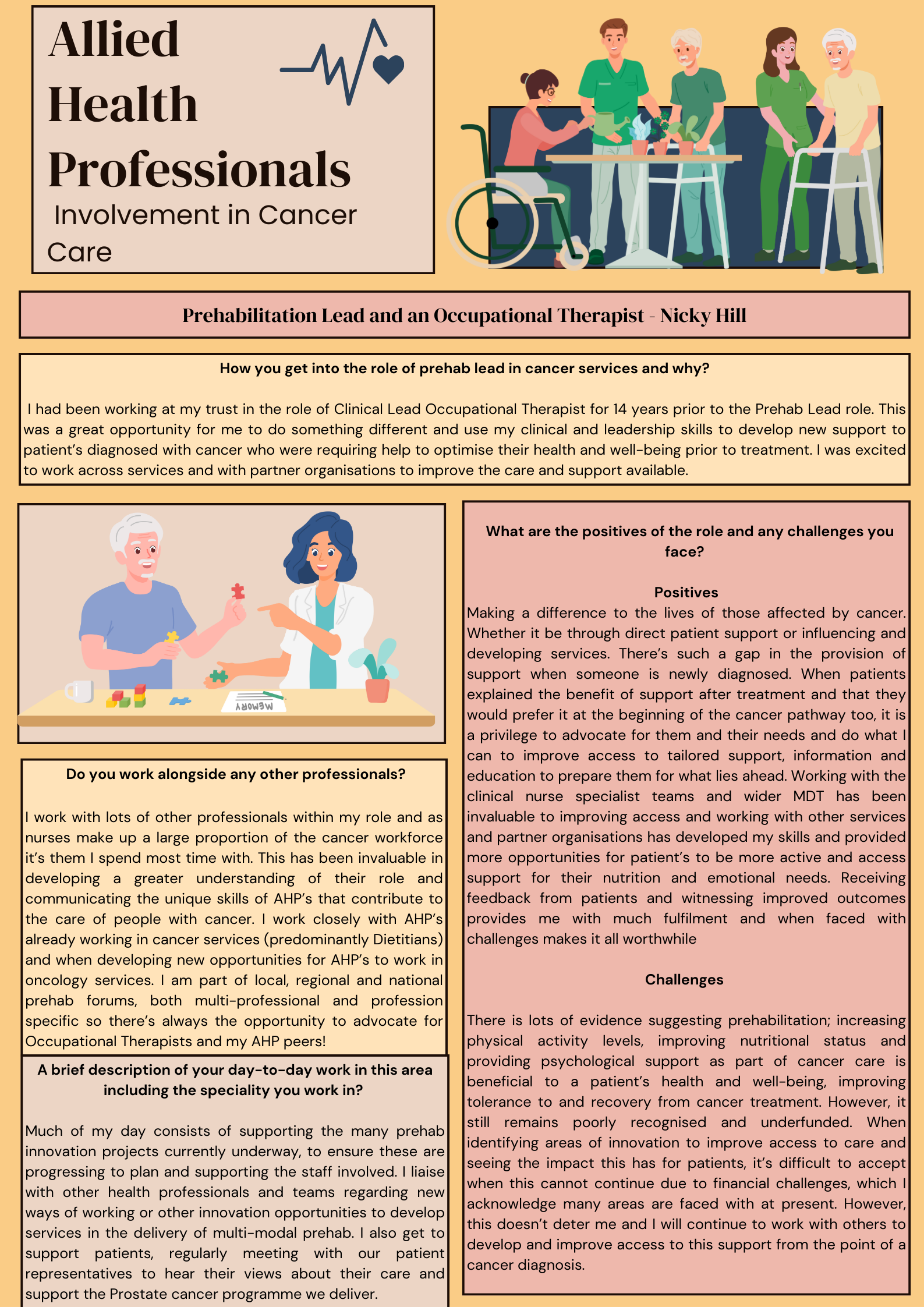
Dietitians have an essential role in assessing, managing and treating the nutritional problems that cancers and their treatment cause. They provide guidance on the optimal nutritional management at each stage of care, including diagnosis, treatment, rehabilitation, survivorship, and palliative care (5). They provide patients and their families with practical dietary information on suitable foods to choose, texture modification diets, and meal patterns. If patients are not able to meet nutritional needs (increased energy requirements for cancer patients) through oral diet alone, dietitians can prescribe Oral Nutritional Supplements (ONS). Certain cancers (head and neck) may affect a patient’s ability to safely eat and drink, often necessitating the use of a feeding tube. Dietitians are responsible for ensuring patients receive adequate nutrition and hydration via the tube.
Speech and Language Therapists have an essential role in the care of head and neck cancer patients, particularly for those who experience swallowing difficulties or communication challenges. They carry out assessments and provide therapy to improve swallowing safety and function. They also assist in restoring communication abilities, enhancing patients’ quality of life.
Paramedics ensure the timely transport of cancer patients to treatment facilities. They work closely with the oncology team to ensure safe and efficient transfer of patients.
Therapeutic radiographers specialise in administering radiotherapy, which is a treatment for many cancers. They work alongside oncologists to carefully plan and deliver precise doses of radiation, using advanced technology to target cancer cells while minimising harm to surrounding healthy tissues.
ODPs play a vital role in the surgical removal of tumours. They prepare operating theatres, equipment, and assist surgeons during procedures. They also provide postoperative care by supporting the patient whilst in the recovery room and assesses their fitness to return to the ward.
Physiotherapists and Occupational Therapists are essential during recovery following surgery/treatment. Their care promotes patients’ independence and reduces further complications. Physiotherapists support patients in regaining strength, mobility and fitness by tailoring exercises specific to each patient. Occupational therapists carry out risk assessments following discharge from hospital, ensuring patient safety. They focus on improving patients’ ability to carry out daily activities enhancing the patients’ quality of life.
Art, Drama, and Music Therapists offer psychological support through creative therapies. This can be beneficial to patients coping with the emotional and cognitive impacts of cancer and its treatments. These therapies provide alternative ways to express emotions and process experiences, they are particularly effective for those who may find traditional talking therapies challenging.
Orthoptist diagnose conditions related to eye movement, within cancer this involves the management of ocular and visual issues which can be caused by cancer or the cancer treatment the patient might be having. This is an important role for any patient and specifically in cancer it helps to improve quality of life by treating their vision problems.
Prosthetist/orthotics design and fit orthoses which are medical devices that fit onto the body when there is poor mobility, gait abnormalities, high risk of falls or excessive pain. As part of their role, they can work in oncology by making these orthoses for patients whose musculoskeletal system has been affected by treatment causing decreased mobility and increased pain.
Podiatrists work with any issues surrounding the foot and lower limb and as part of cancer and its treatment these professionals will assess foot related health complications that link to the different cancer treatments. They offer solutions to help with foot function and mobility as well as treating any wounds around that area. This is vital to prevent infections therefore they will also advise on appropriate footwear, foot hygiene, early signs of an issue and preventative measures.
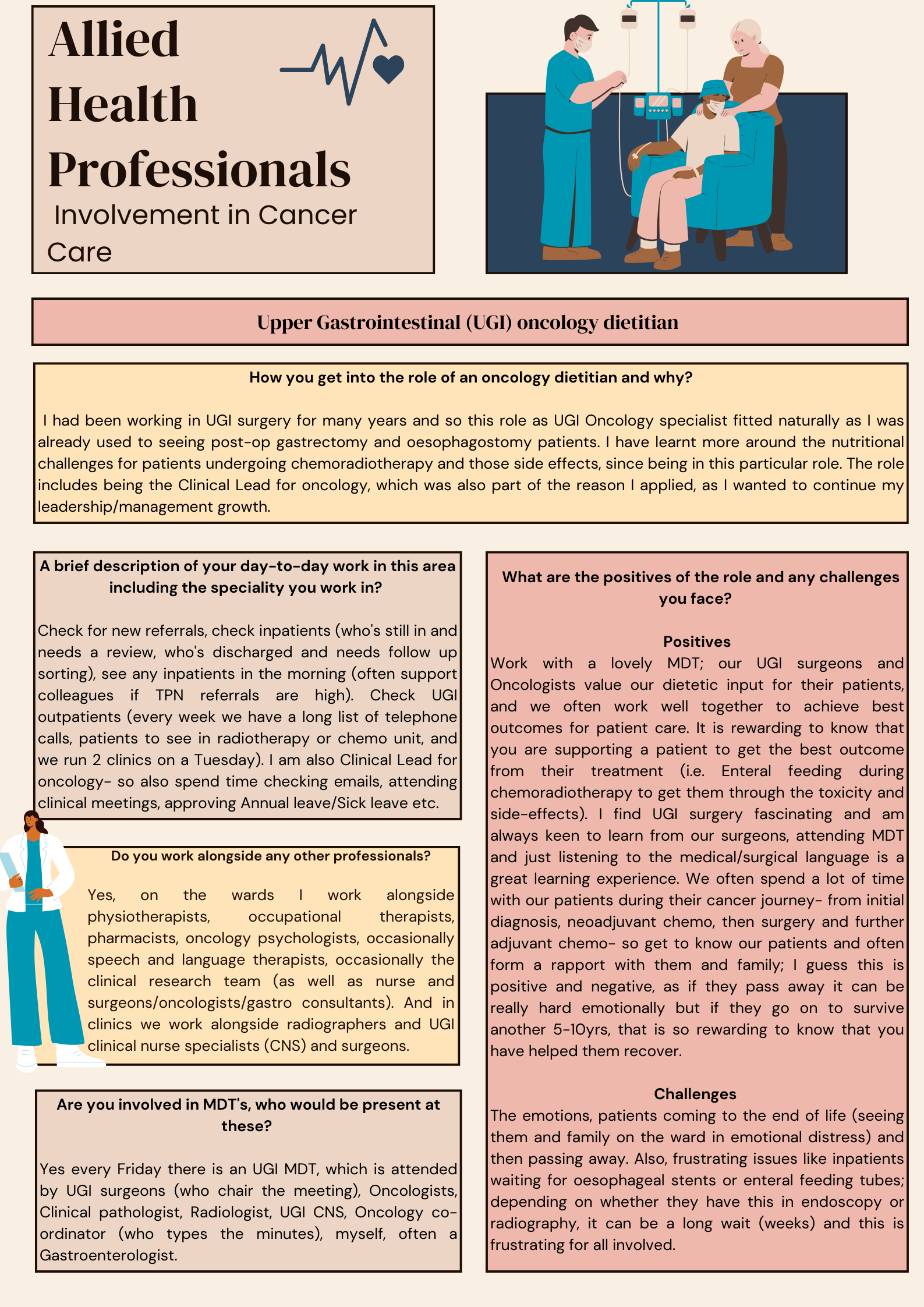
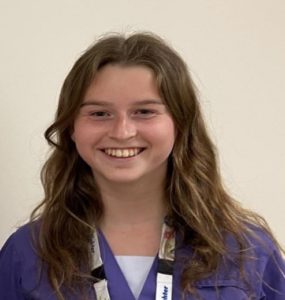
I worked in oncology as part of my dietetic assistant role which I thought was challenging at times however it could be very rewarding. Within my role I covered a few different aspects within oncology including:
Overall, it was a very complex area to work in however I did enjoy this part of my role. I was able to see how many healthcare professionals were involved in this speciality and I enjoyed my experience of attending regular MDT meetings as it allowed me to become familiar with talking to a range of different professionals. This role has made me more interested in the area and a potential career path for the future.
Learn more about the variety of allied health professional roles within cancer care.
The four pillars of practice include clinical, education, research and leadership and management which was created for clinical practice for health and care professionals to work at this standard. Cancer is a specialism with a variety of types and scenarios to manage when working with patients to provide the best possible care and these 4 pillars of practice all link into cancer care.
Clinical practice is ensuring anyone working with cancer patients are practicing in line with their professional body and scope of practice. They should understand their role within the care of the patient as there are many different care aspects involved with cancer patients and act when needed to seek help from another professional. As part of your clinical practice good communication skills should be used with colleagues, patients and families to explain clinical reasonings for the care provided, within cancer care this should be in an empathetic way. This leads onto working collaboratively as a multidisciplinary team which is key within cancer care due to many health professionals being involved including many AHP’s.
Leadership and management can come into cancer care, as an AHP you could be leading team meetings or leading the plan for patients care. This area of care is huge for multidisciplinary working therefore working with a range of different people to provide the best support to the patient and family. Therefore, effective relationships and understanding everyone’s individual role is vital. As part of a good leader within healthcare a person-centred approach should be adopted, this is specifically important in cancer care due to the sensitivity of this condition and the increased need for patient support. A final point on this pillar of practice is managing unfamiliar, complex and unpredictable situations which is key for cancer patients as treatments might not go to plan or not worked as intended with the cancer still present, cancer might have spread around the body making it more complex, side effects are individual to each patient therefore unpredictable until the patient presents with them.
Education is important for any healthcare professional in every speciality. It is there to ensure that clinical skills and knowledge are continually up to date with current research and guidelines. Professional development should be undertaken by any healthcare professional to enable you to work within your scope of practice and provide the best care possible to all patients.
Research also links to all healthcare and can link with cancer care as there is lots of research ongoing about diagnosis and treatment of the disease. All healthcare professionals working in cancer care should have knowledge on the current research within this area and maintain good research practice in line with the guidance. This supports evidence-based patient care to improve the safety, quality and productivity. Another skill as part of this pillar of practice is being able to critically appraise a piece of research and using their findings to apply to your own practice, evidence based. Identifying areas that need further research and acting on these through research studies and service improvement projects. Overall, in cancer care research is needed to improve survival and remission rates (6).
